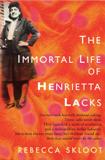The Chicago Council on Science and Technology & Children’s Memorial Research Center Present:
“The Immortal Life of HEnrietta LAcks”
Lecture, Book signing and Dinner with
Best-Selling Author Rebecca Skloot
Featuring Special Guests, Veteran Journalist Bill Kurtis
and WLS TV’s John Garcia,
on November 16
When:
Tuesday November 16, 2010
Where:
Northwestern University Chicago Campus,
Thorne Auditorium,
375 East Chicago Ave.
Discounted parking will be made available to the first 150 attendees LOT-C at 222 E. Huron St.
5pm Members-Only Reception (Available to C2ST Members and Children’s Memorial Hospital Board Members & Affiliated Organizations)
6pm Presentation – book signing to follow – Books will be available for sale by the Northwestern Bookstore ($26 Hardcover)
Online Registration
$10 C2ST Members and Children’s Memorial Hospital Board Members & Affiliated Organizations
$15 Non-Members
At the Door
$20 All Guests
8pm Dinner – Invited guest dinner immediately following the presentation and book signing. Opening remarks and introduction by veteran journalist Bill Kurtis.
RSVP for this dinner is required — Please RSVP no later than November 10
$50 per plate
to make a reservation please email or call
Christopher Rhodes
crhodes@c2st.org / 312.567.5829
Named a Barnes and Noble “Discover Great New Writers” Pick, Skloot’s compelling non-fiction work is now being made into an HBO movie produced by Oprah Winfrey and Alan Ball. Skloot takes readers on an extraordinary journey that explores the complicated legacy of one woman’s priceless contribution to modern science and the medical revolution that followed. Critics have raved that The Immortal Life of HEnrietta LAcks is “Provocative,” (Dwight Garner, The New York Times) and Eric Roston of The Washington Post said the book is “Vivid… A deftly crafted investigation of a social wrong committed by the medical establishment as well as the scientific and medical miracles to which it led.”
Her name was Henrietta Lacks, but scientists know her as HeLa. She was a poor Southern tobacco farmer who worked the same land as her slave ancestors, yet her cells—taken without her knowledge—became one of the most important tools in medicine. The first “immortal” human cells grown in culture, they are still alive today, though she has been dead for more than sixty years. If you could pile all HeLa cells ever grown onto a scale, they’d weigh more than 50 million metric tons—as much as a hundred Empire State Buildings. HeLa cells were vital for developing the polio vaccine; uncovered secrets of cancer, viruses, and the effects of the atom bomb; helped lead to important advances like in vitro fertilization, cloning, and gene mapping; and have been bought and sold by the billions. Yet Henrietta Lacks remains virtually unknown, buried in an unmarked grave. Now Rebecca Skloot takes us on an extraordinary journey, from the “colored” ward of Johns Hopkins Hospital in the 1950s to stark white laboratories with freezers full of HeLa cells; from Henrietta’s small, dying hometown of Clover, Virginia—a land of wooden slave quarters, faith healings, and voodoo—to East Baltimore today, where her children and grandchildren live, and struggle with the legacy of her cells. Henrietta’s family did not learn of her “immortality” until more than twenty years after her death, when scientists investigating HeLa began using her husband and children in research without informed consent. And though the cells had launched a multimillion-dollar industry that sells human biological materials, her family never saw any of the profits. As Rebecca Skloot so brilliantly shows, the story of the Lacks family—past and present—is inextricably connected to the dark history of experimentation on African Americans, the birth of bioethics, and the legal battles over whether we control the stuff we are made of. Over the decade it took to uncover this story, Rebecca became enmeshed in the lives of the Lacks family—especially Henrietta’s daughter Deborah, who was devastated to learn about her mother’s cells. She was consumed with questions: Had scientists cloned her mother? Did it hurt her when researchers infected her cells with viruses and shot them into space? What happened to her sister, Elsie, who died in a mental institution at the age of fifteen? And if her mother was so important to medicine, why couldn’t her children afford health insurance.
 Rebecca Skloot:
Rebecca Skloot:Rebecca Skloot is a science writer whose work has appeared in The New York Times Magazine; O, The Oprah Magazine; Discover; and many other publications. She specializes in narrative science writing and is the guest editor of The Best American Science Writing 2011, a contributing editor at Popular Science magazine, and has worked as a correspondent for WNYC’s Radiolab and PBS’s Nova ScienceNOW. She has been featured on numerous television shows, including CBS Sunday Morning, The Colbert Report, Fox Business News, and others. Skloot served for eight years on the Board of Directors of the National Book Critics Circle, where she was a vice president and judge for their yearly book awards. She has a B.S. in biological sciences and an MFA in creative nonfiction and has taught in the creative writing programs at the University of Memphis and the University of Pittsburgh; she’s also taught science journalism in NYU’s graduate Science, Health and Environmental Reporting Program. She currently teaches writing workshops and gives talks on subjects ranging from bioethics to book proposals at conferences and universities nationwide.
 Bill Kurtis
Bill Kurtis
Bill Kurtis, veteran journalist and co-anchor of the CBS 2 news at 6 p.m. in Chicago and current host of A&E crime and news documentary shows, including Investigative Reports, American Justice, and Cold Case Files. Previously, he anchored CBS Morning News.
 Q&A Session with WLS TV’s John Garcia:
Q&A Session with WLS TV’s John Garcia:
John Garcia is a general assignment reporter for ABC 7 News. He joined ABC 7 News in 1994 and served as co-anchor of ABC 7 Sunday Morning News from 1995-97.
